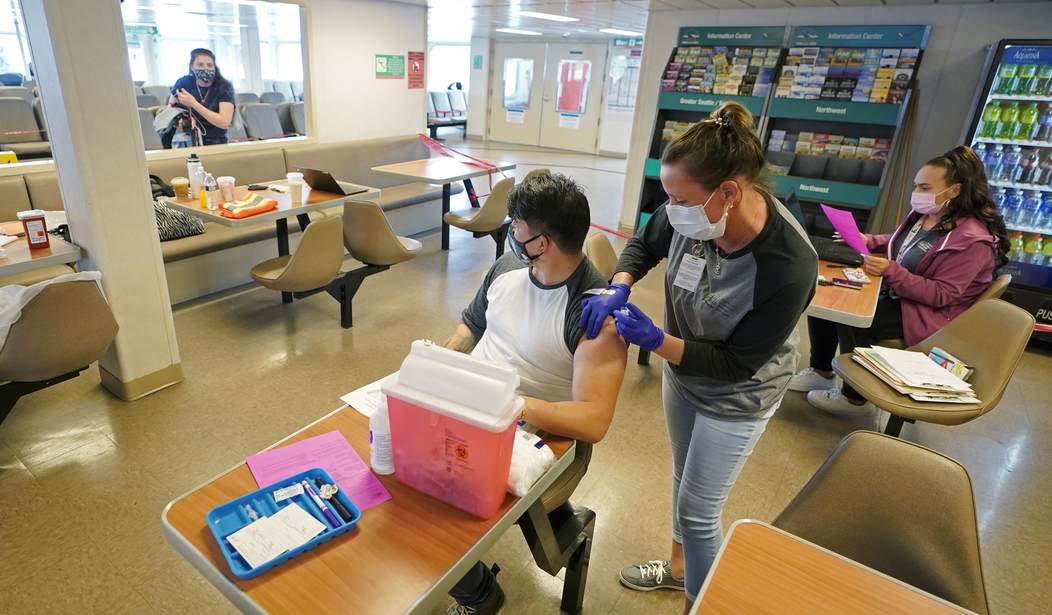Once they began in Israel and Europe, it became virtually inevitable that we'd be seeing booster shots here in America; sanctioned ones, that is, as opposed to people gaming the system to get a third jab on their own (CDC estimates that more than a million people have already done this). So the Biden administration's new guidance on top-up's is hardly unexpected. In case you missed it, here's the drill:
The Biden administration has decided that most Americans should get a coronavirus booster vaccination eight months after they received their second shot, and could begin offering third shots as early as mid-September, according to administration officials familiar with the discussions. Officials are planning to announce the decision as early as this week. Their goal is to let Americans who received the Pfizer-BioNTech or Moderna vaccines know now that they will need additional protection against the Delta variant that is causing caseloads to surge across much of the nation. The new policy will depend on the Food and Drug Administration’s authorization of additional shots. Officials said they expect that recipients of the Johnson & Johnson vaccine, which was authorized as a one-dose regimen, will also require an additional dose...Officials envision giving people the same vaccine they originally received.
The FDA recently authorized third doses of the mRNA vaccines for certain people with weakened and compromised immune systems, and it looks like the elderly will also be at the front of the line for boosters. The New York Times story quoted above includes a number of interesting details, including Moderna exploring the possibilities of half and full doses for third shots. One question I have not seen answered adequately, or at all, is whether extra doses are advised (or even remotely a good idea) for people like me who are fully vaccinated and have recovered from COVID -- whether via a breakthrough case, or among those who contracted the virus before the vaccines were available. Previous studies suggested that both natural and vaccine-conferred immunity were quite strong and long-lasting. Combining both would seem to be very effective at warding off another case, yes? Many people are in this boat. In any case, this is why Israel started offering extra jabs:
Recommended
The latest Israeli data, posted on the government’s website on Monday, shows what some experts described as continued erosion of the efficacy of the Pfizer vaccine against mild or asymptomatic Covid-19 infections in general and against severe disease among the elderly who were vaccinated early in the year. One slide suggests that for those 65 years or older who got their second shots in January, the vaccine is now only about 55 percent effective against severe disease. But researchers noted that the data has a wide margin of error, and some said other Israeli government data suggested the decline in efficacy was less severe.
Waning protection plus a very contagious variant has been a rough combination, even in one of the world's most heavily-vaxxed nations. So how is their booster shot program working? Quite well, it seems. Allahpundit runs through the data, and it's obvious why other countries are following suit: "Ever since Israel started dosing out third shots to the olds a few weeks ago, the virus is spreading less among that group while it continues to spread among the unvaccinated. And as for *severe* cases, the vaccine has been strong at prevention all along." One visualization:
Israel started administering a third dose to 60 y/o and above on July 30
— Eran Segal (@segal_eran) August 15, 2021
By now, over half of this age group received the 3rd dose
In the two weeks that passed, the relative fraction of cases of 60 y/o and above who are vaccinated out of all cases dropped from ~12-14% to ~6% pic.twitter.com/wOQCRPr5BD
Another wrinkle to all of this is that Israel's successful third-shot regime flies in the face of WHO guidance, which urges wealthy countries to postpone booster shots until underdeveloped nations are able to get shots into the arms of their populations. I can see the argument here: Isn't it an indulgence of questionable morality for prosperous countries to be delivering top-ups when legions of people around the globe don't have any protection against the deadly virus? On the other hand, are wealthy nations -- especially the ones who helped develop the vaccines -- supposed to withhold life-saving, risk-reducing shots from their immunocompromised and elderly citizens? Then there's the matter of domestic optics:
Unbelievable
— Reuben Rodriguez (@ReubenR80027912) August 17, 2021
If guidance is “ppl 65+ should get an annual booster” that’s fine
But not only is 3 shots for ppl <65 not based on science...
Can you image a worse way to persuade 80M ppl to get thier first shot than saying you need 3 total?
Also will 5yr olds get 3 shots? https://t.co/OsCe678z26
Recommending a third shot for high-risk groups is one thing; recommending universal boosters is another. Is it medically necessary? And the point about creating a harder sell for the vaccine hesitant is an obvious one. I'll leave you with some good news, which is that more of those skeptics have been coming off the sidelines as terrible situations like this play out among the unvaccinated:
Monday just in: +858K doses reported administered, including 507K newly vaccinated. Now 70% of all eligible (12 years and older) with at least one dose. Keep it going!
— Cyrus Shahpar (@cyrusshahpar46) August 16, 2021
Tuesday just in: +603K doses reported administered over yesterday's total, incl. 334K newly vaccinated. Every state has 50% or more of their 12+ eligible pop. w/ at least one dose, with some states exceeding 80%. Need high vaccination coverage everywhere to be fully protected.????
— Cyrus Shahpar (@cyrusshahpar46) August 17, 2021
Question: More than 350 million COVID vaccine doses have been administered in the United States. Why on earth can't the FDA fast-track full approval of the damn things, a step that could help get some waverers off the fence?

























Join the conversation as a VIP Member